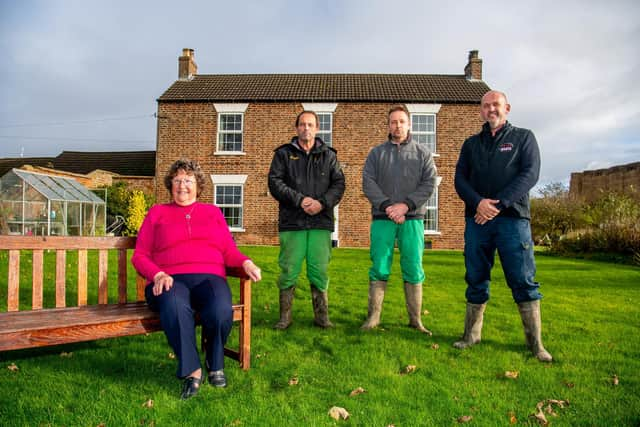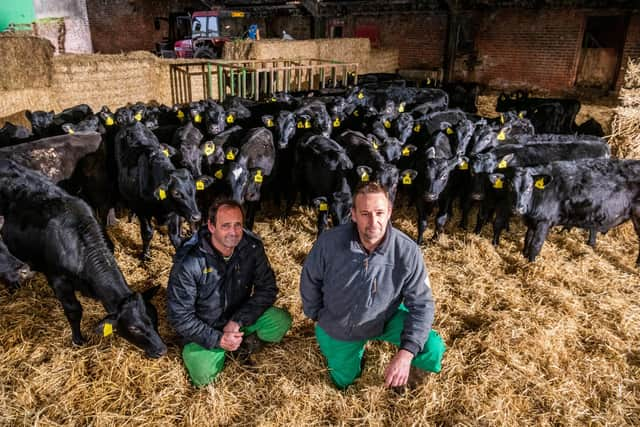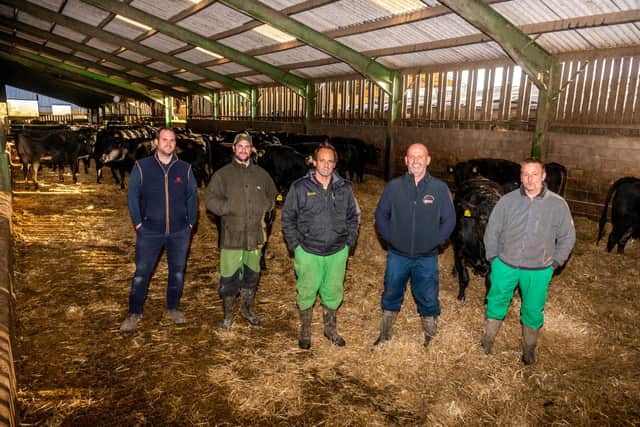Farm of the Week: Former dairymen in Yorkshire who now have UK's only olive-fed Wagyu beef cattle
It was 2018 that the Thompson family moved out of milk, sold their herd and shifted their focus to running a beef enterprise that would see them with no more worries about calving or producing their own herd replacements.
Nor would they have concerns about the fluctuations in the milk price they would receive each month and would instead see cattle coming on to the farm at three to four months old, a guarantee that the cattle would be bought back from them, after rearing them to finish, and more recently see them feeding olives to their cattle.
Advertisement
Hide AdAdvertisement
Hide AdLife has certainly changed for the Thompson family of Scurf Dyke, near Cranswick in the East Riding, where their daily routine is no longer one of having to get up at five thirty every morning for milking, nor being back in the parlour and washing down until half past eight in the evening.


Roy Thompson, one of three brothers on the farm, says that it has been very different to what he and brothers Ian and Keith, who farm together along with Ian’s sons Daniel and Russell, had been used to, and it has taken time to adjust, but there are no regrets despite having enjoyed working with their dairy cows.
“None of the three of us are getting any younger,” says Roy. “And it’s only when you come out of dairying that you realise how tying it is. It was getting hard and you can’t get others to do it now. It was a painful time for us in the lead up to making our decision over coming out of having them, more because it was what we had always done and we knew all of our cows.
“We had 200 black & whites. We didn’t know which way to go when we were thinking of what we should do instead. Luckily for us we had a fellow called Jamie turn up from Warrendale Wagyu who said we could fatten some Wagyu cattle. It’s all gone on from there.”
Advertisement
Hide AdAdvertisement
Hide AdRoy says they haven’t looked back since and having started with just a few, the Thompsons now currently have around 1,200 cattle on at any one time. “We never said no, as the numbers kept increasing. We just kept filling up and filling up, building new sheds. We now have nine sheds altogether in our farm business that runs across around 1000 acres we own, plus another 500 acres we rent.


“We are all Wagyu now. They are our main business. We buy the cattle from Warrendale Wagyu, who source all of the calves, and they come at between three to four months old. We take them all the way through to 26 months. We then sell them back to Warrendale Wagyu.
“Everything goes at 26 months regardless of weight and our average across both steers and heifers is 400 kilos deadweight. They are fed on a fat ration for about ten months which is a bit longer than ordinary Wagyu because they want them to be on the heavier side. They are fed a young stock ration from arriving on farm to seven-eight months, and then a growing ration to 16 months.
Roy says that he and his brothers and Daniel, and William who works with them have worked hard on ensuring the feeding regimes are spot on to what Warrendale Wagyu require and that the proof of their hard work has come through that Warrendale having chosen them as the only UK farm fattening Wagyu for their prestigious olive-fed status.
Advertisement
Hide AdAdvertisement
Hide Ad“I’d say the way we have worked since leaving dairying has been just as hard as when we were dairying, although working differently to when we were milking, because Warrendale have continued to supply more and more cattle.


“But we must also be doing things right because we were chosen for olive-fed farm status. We are proud to be the only Wagyu farm in the country doing this. Over in Japan olive-fed Wagyu is something really special. Over here Warrendale are supplying our olive-fed beef to Freedown Foods, who supply high end restaurants and high end food retailers as Freedown Hills Olive Fed UK Wagyu Beef.
“We trialled it first by feeding olives to just five cattle and then we upped that to fifty a month. It has now led to putting up four new sheds. We’ve just had a two-year building splurge. We are now sending 50 cattle per month on olive-fed contracts. That will go up to 55 shortly, and then 60.
The Thompsons have largely kept to a system of grazing as they would have with their dairy cows.
Advertisement
Hide AdAdvertisement
Hide Ad“All our Wagyu go out to graze at some time in their lives. They are all housed inside from the end of October and are out from the beginning April, dependent upon weather and conditions. It’s a similar system to when we had the dairy cows, but because we have a great deal more stock on the farm and it is growing stock, we need more barley, in order to feed them. That’s where the arable operation has altered with a greater emphasis on barley and maize, plus grass.
“We don’t now grow a lot of wheat,” says Roy. “We grow mostly barley and maize. This year’s harvest saw us with 100 acres of wheat, 220 acres of maize, 100 acres of winter barley and 350 acres spring barley.
“We all help each other, but Ian and Keith are more the arable side and I’m more the cattle.” Ian gives the lowdown on arable performance this year.
“We grew Tardis winter barley this year and Diablo spring barley. They were both new this time. Tardis yielded between three to three and a quarter tonnes per acre and Diablo made a good two and a half. Our winter wheat was Spotlight and Graham. We’re just using Spotlight this coming year and with the weather being bad we haven’t got all of that in yet.”
Advertisement
Hide AdAdvertisement
Hide AdRoy says the Thompsons have recently added another income stream to their farm. “We now have ground mounted solar power across 243 acres. It’s not on yet although everything is in place, that’s not down to us. We receive a rent, that’s our part. It came at the right time for us. We were approached by a company called Baywang in 2019-2020 who came to us because we have pylons going right through our land. It was a no-brainer so far as we were concerned because in 2019-2020 we hardly sold any wheat as it was so wet.”
It’s all change at Scurf Dyke from the days when Roy and his brothers’ dad Hubert had a dairy and sheep farm. For Roy, who enjoys watching football and rugby, farming over the past five years has become a whole new ball game.